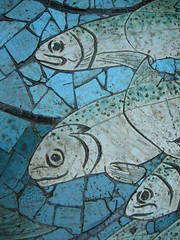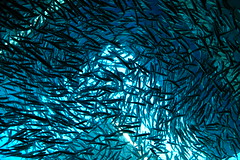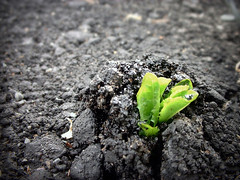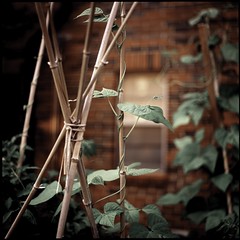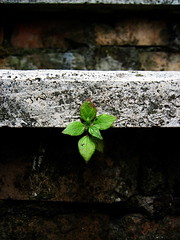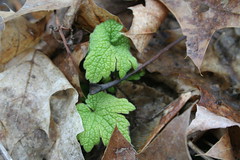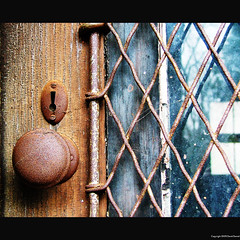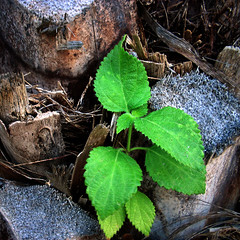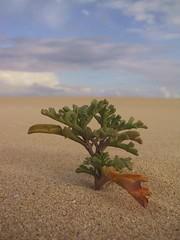Salmon Song
Singing, singing, throw a life into the sea
Like salmon flinging, ringing out the changes,
Strong charges of their swimming, leaping destinies
Running home to spawn and die. I too
Fling, sing, dive down, hurl forth again
Gladly in Thy name;
Unfurl my length, uncurl coiled strength without reserve
To move more sleekly, sing more sweetly,
Better serve; help stir the waters running through this earth
Help move, help birth, a world.
Swim strong, to God return, give all:
It is a cleaving song that calls,
And life that in the losing lives.
by Paul Martin
© 2007 Lynne Ann Martin
LIP brings out poetic writers whether their poetic writing is in form of poetry, haiku, prose. To LIP it’s that poetic serenity that furnish layers of poetry in whatever kind of form.

Paul in his new website www.originalfaith.com but to me, I have known him in his blog titled by "Spiritual Dialogue". His blog was among the first blogs that I started reading. His blog puts a poetic touch in understanding the unity in a religious as he puts in his own word "I would like the focus to be at least as much on noticing what unites us as what divides us." as stated by Paul.
If you have been given a chance to introduce Paul, explaining to other who is Paul? What would you say about Paul? (In another way can you tell us more about you, the person beyond your writing)?Thank you, Nasra, for beginning with something central to my point of view. I’d like to pick up on that right away – the fact that my primary interest is in what unites people spiritually.
The word "God," which I use in the poem above, can itself be a source of disunity. People can mean different things by it. The primary association for many people is belief in the existence of a supernatural entity which, of course, atheists don’t believe in at all.
I view people as being spiritual by nature. My book Original Faith: Becoming Our Truer Nature focuses on experience instead of doctrine. I’m careful not to use words like God – or for that matter “spiritual” – without first grounding them in language that evokes experiences that we share as human beings, then defining and conceptualizing them strictly on that basis.
This approach is compatible with having religious beliefs – or not. And it’s this experience-based approach to spiritual life and development that at times gives my writing literary qualities. That’s the kind of writing that helps to evoke and refer readers to similar experiences they’ve had for themselves.
As to the person beyond the writing, in a way that person doesn’t exist. I’ve written about what matters most in life as far as I can tell. As words have come to me over the years, I’ve tried my best to live by them in my life as a whole.
My work life consisted of a twenty three year career working with elementary school children, first as an English as a Second Language teacher and then as a school counselor. My private life was spent getting up very early to jog or meditate followed by writing for a few hours before heading out for work. On weekends I often had some time to spend among a small circle of friends and relatives.
Paul you have concentrated on religion studies and all what is related to it but from time to time, you seem to color the discussion with petals of your poetry. What does poetry means to you? Where you pick your inspiration? (is it nature mostly)
Poetry was a surprise following a surprise. My prose work on what would become the manuscript for Original Faith began as notes I took for my own use until I noticed they were falling into categories that might make for a book. Then, a few years into writing regularly, I came in from jogging one morning and “had” a poem! I’ve never written one on purpose. Nature has been the greatest source of inspiration. As long as I was already up so early I used to jog just after dawn – a beautiful time to be up.
Your blog have examined different aspects of religion? Where poetry and religion fall? Are they are any intertwined between the two?
My blog does look at different aspects of religious thought. A bit randomly! Most of my posts aren’t very much like the book, though I do plan to change this – I plan to post excerpts as it gets closer to the book becoming available. Many of my current posts come from a less impassioned, more analytical point of view. I just find that easier to do in the short format needed for blog posts. However, to break this up, I occasionally post essays and poems.
Spirituality and religion often find expression in poetry. In my own writing, poetry and prose both focus on this area. My poetry relates more to immediate experience. Original Faith adds meaning to immediate experience by going a little way toward conceptualizing it; offering some insights; considering relationships between, for example, love and faith. But I go only “a little way” with conceptualization because it’s easy to go too far. It’s easy to end up playing games with language and logic. So my thoughts about experience don’t stray far from experience itself.
If I say poetry is writing and writing is poetry? Do I agree with definition and what is your point of view of it?
Some prose does possess poetic qualities like sharp imagery or musical use of language. So when it comes to writing, I’d tend to see poetry, good fiction, and nonfiction that has a large element of creativity, as having a lot in common.
"Accidents and disease-onsets happen everyday – to the good, the bad, the ugly, and the beautiful. And old age that becomes advanced enough brings anyone pain, loss of mobility, physical fragility – the sorts of things that some of us are brought face-to-face with in earlier years." This is quoted by you as you have been tying voice up strength to someone who had gone through this road. We understand it has not been easy for you as facing rare illness and your battle to overcome all the hurdle is on going road for you? Would it be possible to open up to us and to tell us a bit of your illness? How you find the strength to go beyond obstacles. How do pluck a flame of hope in the mid of hardship?
The specifics of my condition are very unusual. Over a decade of extensive research and medical travel produced no diagnosis, not even at leading facilities like NIH and Johns Hopkins. My case is so unusual that it’s hard to give a brief description that people can quickly relate to or understand.
In a way it compares (but maybe not so favorably!) to advanced old age. Physically I’m very fragile because peripheral nerves, muscle, connective tissue, and bone are all pervasively affected. I’m extraordinarily limited in the physical positions I can assume and have been unable to leave the house by any means for well over two years. I’m in widespread, intractable pain.
None of this started until June of 1994, when I was thirty seven years old, which was long after I’d found my basic direction in life. While the adjustment from good health to progressive disability and pain took many years to come to terms with, it was never a challenge to the outlook that had developed during my physically healthy years.
How have I found the strength? It’s been a process. While my condition has diminished and actually ended my life in many aspects, in a way it’s still been one single process that in my case happened to begin with ease and joy, then proceed into struggle and pain. To try to briefly suggest/summarize:
We don’t own our lives. We’re called to fully own up to what we only borrow for a while. To begin owning up to this is to find ourselves more and more identified with far more than any self alone can ever be. Becoming enlightened, finding our Buddha nature, developing “Christ consciousness,” becoming more human or humane… I think these are all different terms for one thing. Different traditions have different terms and that’s very much OK once we begin to really learn what we are saying.
We can experience this transformation of our identity through joy. Joy takes us out of ourselves, opening us up to a greater world. Terrible or terribly sustained adversity can also take us out of ourselves. Either we eventually allow it to part us from our unhappy reactions over things not going our way; or these reactions, on top of our misfortunes, can overwhelm us.
No one enters the world with a guarantee of health, happiness, success, or safety. Rather than say "Why me?" it is far more constructive and realistic to ask "Why not me?"
The Way and the Strife
It’s possible to go nowhere.
Or we can find a path and take a way.
If we are fortunate, it is a way of joy. Joy is movement. Joy takes us out of ourselves.
If we are less fortunate, it is a way of pain. Yet adversity that is great or sustained enough can also have potential to take us out of ourselves after the kicking and screaming are over.
But I think it is the same basic path either way - and for every one who takes it.
© 2005 by Paul Martin
There is saying in my part of the world "God does not take everything from you", do you believe facing the turmoil of illness there other tributes you have gained? Prehaps you have gained perspective in living?
The major change has been the uncovering of strength far beyond anything I could have imagined when I was healthy. My condition requires me to live without joys, comforts, and sources of inspiration that I once couldn’t have imagined doing without.
A Forest Place
The woods are lovely, dark and deep
A poet from my home state said
And sowed another thought to reap:
That woods are lovely, dark and deep
As women who men dream of in their sleep
And when they waken ever seek to find;
The kind with thoughtful, mild and pensive brows
A shady place of winsome, ever-beckoning ways
Like dappled forest paths that fade and wait
Recede among the farthest trees
Enchant with all that lies so deep…
With hair more fragrant
Subtle-sweet
Even than the sudden scent of pine;
And arms wind-soft
To clasp, encircle men as gently as the air, but visibly –
More beautiful bower of graceful curves than these brown trees.
…and eyes like starlight-gleams
That shine between the highest branches in the dark
And mark a wider sweep of things
An endless arc
From which a fathomless compassion springs.
A woman is a tender earth
A sheltered home, a dark embrace;
A woman is a holy ground
A woman is a forest place.
By Paul Martin
© 2005 Lynne Ann Martin
They say God test us as he puts in peek of hardship, where writing and poetry falls in this pit of falls?
I think it depends on the kind and degree of hardship and where the person happens to be with their life and in their writing when it occurs. Sometimes hardship is a catalyst for creativity but if it’s severe or prolonged enough it can thwart creativity.
“I consider myself profoundly as well as superficially Christian. In the sense that I am profoundly Christian, I am also profoundly Jewish, Muslim, Buddhist, Hindu, and human.”
Paul Martin,
3/27/05 www.spiritualdiablog.blogspot.com
You choose to blog about a very sensitive matter about religion what the lessons that you have gained and experience from running such dialogue?
It may be that it’s so sensitive because we so often focus on our differences. I think we’d do well to emphasize the things we have in common – matters that we can experience and know first hand. What love is, what faith is, the chief obstacle in everyone’s path – these are a few of the things I discuss in Original Faith.
As to that “superficial/profound” contrast, I was referring to my perception that all of us participate in certain profound truths that our various traditions strive to articulate. I would say that my primary religious identification is that I am a person. My particular heritage, a relatively superficial matter, happens to be Christian. When I happen to make use of language or imagery from the Christian tradition, I use it for its power of great hearted inclusiveness, not for parochialism and exclusivity.
Help Build
A human being, whatever special mix of gifts
He owns, wherever placed by circumstance
Can find a way that is the way of He who calls
And balanced so upon the narrow walk gains strength
Can strike the cleanest, hardest, telling blow yet never falls.
O he can strike
From stone draw light
Can flake a spark
That works in love.
Come, act;
Come act in love.
Come move, come strike
O wield the hammer that is yours to wield
This world is womb of God: serve, deliver him,
Help build his world
Help build a kingdom suited to a King,
Help make, increase, the godliness of things;
Through work of yours let music of his call resound
Down other centuries, through more millennia of sun-rounds
To rounder, sounder, sweeter worlds than this;
Help build a World
Help wield a brush across the deep
Help hammer, chisel features in a wall of stone
Hear in the dark how nature stirs and moans
Grows more humane
Throws off another cloud of sleep:
This world once moved becomes a gentler place
Wears more and more the imaged look
Of a compassionate Father’s face.
O praise with works the One who calling comes;
O work while there is time to act with love.
By Paul Martin
© Lynne Ann Martin 2005
One of your views, you covered mediation. Do meditations help in the process of our writing?
I found meditation a wonderful method for helping with the process of my life. Its impact on my writing was large, but mostly indirect. However, there was one particular aspect of the book that came about as a direct result of meditation: I would have had less to say about love, faith, and their interrelationship if I hadn’t meditated.
Do you feel writing has bring sense of strength and completion to who you are?
It was interesting to me to see how writing entered into the process of my life as a whole. Many insights occurred as a direct result of sitting down to write every morning. These insights in turn affected how I lived.
Experience Metaphor
We often approach the issue of meaning in life by looking for a reason to live, when real meaning resides in the experience of our love, its purpose, and the self-transcendent identity to which it calls us. A meaning to life is not some series of patches we apply to holes in a fragile raft of reasons by which we can somehow hope to float over the sheer mystery of being here to live and die. Meaning in life is learning how to swim and how water feels against the skin. It is feeling what it’s like to go with the flow and what it’s like to struggle against strong currents, tiring. It is knowing water as our own element: from out of which we were born, into which we can live, and into which we are to die wonderingly. Though we may not fully know the meaning of life, we may fully live it.
Original Faith: Becoming Our Truer Nature – from the introduction
By Paul Martin
© Lynne Ann Martin 2007
Where would you like to go with you writing? How far you wish to go on debates on the studies religion?
Original Faith was truly a labor of love and the work of my lifetime. It’s what I have to say as well as I can say it. I hope it can get into the hands of enough readers to maybe do a little good. I have two additional complete manuscripts and a third half finished, but these are secondary matters for me.
Paul you have established a dedicated readers for your blog. In the world of technology, fast moving, do you feel new generation tend to loose ways or connection with religion?
I’d tend to see technology as spiritually and morally neutral, holding promise for doing good or harm depending on what uses we put it to.
Do you feel there is thirst for finding paths towards spirituality’?
Religion and spirituality seem to be getting more media attention in recent years. Much of it is certainly genuine; some of it has the feeling to me of a fad.
~I Know~
I know there wouldn’t be much left of me if you subtracted things I’ve learned from fields and trees, the way wind plays and branches sway, and how great darkness brightens what little light it holds until it sparkles.
Original Faith: Becoming Our Truer – from Chapter Seven, Nature’s Work of Transformation, by Paul Martin
© Lynne Ann Martin 2007
You are currently working on publishing a book. Can you tell us more about it? How long did it take you to compile for publication?
The theme of Original Faith is identity transformation and its implications for how we live in the world. Chapters include love, faith, a sense of life’s greater promise, ego as an obstacle to going the way of faithful love, spiritual practice, works of daily life (moral action), and work.
Early chapters invite readers to enter into an identity-shift away from ego and toward love. The book then points readers toward further transformations of identity that may develop as we proceed further in this direction.
All told the book took about twenty five years to complete. In 1994 it was nearly done; however, that was the year my medical condition started. I ended up having to set the manuscript aside for most of the next decade because of the illness and everything surrounding it: extensive medical research and travel while continuing to work full time; battling my HMO for benefits; endless treatment regimens over a period of several years that accelerated the pace of my decline because I’d been misdiagnosed; and similar matters.
What are the challenges that you faced in publishing the book?
The main challenge for anyone trying to get a book published in the US today is what’s known as the “marketing platform” – name recognition or some other strong indicator that your book is likely to sell well. Publishing, like many other endeavors (including health care), has come to focus on maximizing financial gain to the point where concerns for quality of the work are often overridden. Publishers are rarely willing to take a chance on an unknown author, especially in the case of nonfiction and regardless of the author’s qualifications to write in his or her area. While some great books still get widely published, a lot of good stuff gets filtered out. And lots of mediocre stuff from well-platformed persons who may not even be writers ends up on bookstore shelves.
Where we can set an order for your new book?
Information about the book is on www.originalfaith.com along with a contact form for anyone who’d like to be contacted once the book’s available several months from now. My site will be modified at that time and people will be able to order the book at Amazon.com or by going to my site which will link directly to the book’s Amazon page.
~Acknowledgments~
Today, a bright summer morning, I was lying on my living room floor enjoying looking up into the branches of a tall tree outside the window. Suddenly I had an insight relating to the book and put it on paper. Forty five minutes later, engrossed in writing, it struck me that it was probably my relationship with the tree that had made this insight possible. It wasn’t at all clear to me that I would have had it in the kitchen, bedroom, or at my writing table. In fact, I tend to doubt that I would have. Gazing up at the tree had somehow put me in a relaxed, gently searching frame of mind which had produced the result.
And later in the morning, this thought elaborated itself further to me while jogging and watching the hot disk of the sun glowing roundly from behind the mist: How often do we fail to notice all that is quietly there for us, supporting and allowing for the things we do? Had I ever acknowledged the sun? The sun that gave birth to all the heat and warmth we know and provided the clay of this earth from out of which the amazing complexities of our bodies and brains were created? I have done nothing by myself – ever.
By Paul Martin
© Lynne Ann Martin 2007
After book publishing – what is on your horizons for Paul?
After Original Faith, I have two more completed manuscripts and a third that’s half finished. To me, Original Faith feels as much like my real job as my twenty three year career with children did – plus now I really can’t do much of anything away from the computer keyboard. So for both positive and negative reasons it looks as though this may be as far as my horizons extend.
Since LIP is a blog, just want to know did blogging have opened up opportunities for you? If yes, in what ways can blogging be a door of opportunities?
I’m still trying to figure that one out! In my situation, my only means of reaching out to others is through use of the web. I can only hope that it will be effective.
LIP voice out to those who want to pursue writing of any form: Is follow you writing. What would your words be to us or advice for us?
Get a marketing platform. Otherwise getting your book read by more than family and friends will be tough. If I could still get around I’d have been willing to go back to school for my Ph.D. to try for teaching at the university level. Professors teach classes and give lectures; that’s a platform. Or I would have gotten creative and figured out a way to incorporate some form of regular public speaking into my existing career.
Paul, we here at LIP salute your willpower and thank you for allowing us to come up-close to you. Your life glimpses as a writer and as a person gives us inspiration to those who wish to taste the water of writing but beyond that it is how you turned around in the face of illness. As for me I look at it that illness can tremble our body down, can put our limbs into pain but it can not deter our spirit, for our spirit steers beyond the calamity. Once again Thank You.
Nasra, I’ve admired your work with charity and poetry for some time now – I was fortunate to have run across one of your blogs not long after I started blogging. Thank you for your invitation. You ask really good questions.
Reaching the end of this interview, Im sure you wonder what does the photos represent and why I have selected plants growing in rocks or in desert, to me in every plant you view in this article is how Paul spirit is ....The Spirit of hope grows even on Emptiness ....
(The photos belongs to different photographer from flickr.com, their names are mentioned below the photos, if you enjoyed the photo click the image and leave them a comment)

